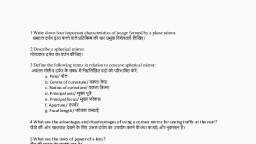Question 1 :
When a ray of light passes through a rectangular slab, made up of some transparent material other than glass, the emergent ray is
Question 2 :
A rod is placed in a beaker of full of water. It appears to be bent inside the water. Which of the following property of light is responsible for the rod appearing to be bent?
Question 3 :
Which of the following term is not associated with a lens ?
Question 4 :
What is the formula for spherical mirrors for object distance p and image distance q ?<br/>
Question 6 :
If the light moving in a straight line bends by a small but fixed angle, it may be a case of<br>$(i)$reflection<br>$(ii)$refraction<br>$(iii)$diffraction<br>$(iv)$dispersion<br>
Question 7 :
The focal length of a concave lens is $2m$. Then the power of the lens is:<br/>
Question 8 :
Which of the following term is not associated with a lens?
Question 9 :
When a monochromatic light wave passes from air to glass across a plane surface of separation then:
Question 10 :
A thin film of thickness i and index of refraction 1.33 coats a glass with index of refraction 1.50. What is the least thickness/that will strongly reflect light with wavelength 600 nm incident normally?
Question 11 :
<br>Which is the human organ which behaves like an optical instrument having lens and a screen?
Question 13 :
A unit vector along the incident ray of light is $\hat{i}$. The unit vector for the corresponding refracted ray of light is $\hat{r}\cdot \hat{n}$, a unit vector normal to the boundary of the medium and directed towards the incident medium. If $\mu$ is the refractive index of the medium, then Snell's law (second law) of refraction is :
Question 14 :
Ratio of the size of the image to the size of the object is known as:
Question 15 :
Assertion: Magnetic field lines are continuous and closed.
Reason: Magnification of a convex mirror is always positive, but that of a concave mirror may be both positive or negative.
Question 16 :
A concave mirror of focal length $f$ (in air) is immersed in water $(\mu=4/3).$ The focal length of the mirror in water will be
Question 17 :
A ray of light incident at the optical centre of lens, passes undeviated after refraction.<br>
Question 18 :
A ray of light passing through the .......... of the lens, passes on undeviated.
Question 20 :
A short sighted person can see distinctly only those objects which lie between $10cm$ and $100cm$ from him, The power of the spectacle lens required to see a distance object is






























